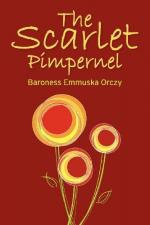And now these were to be given up: Oh! there could be no question of that. Even before consulting with his father, Henri knew that the papers would have to be given up. They were clever, those revolutionaries. The thought of holding innocent children as hostages could only have originated in minds attuned to the villainies of devils. But it was unthinkable that the children should suffer.
After a while the young man roused himself from the torpor into which the suddenness of this awful blow had plunged him. By the light of the lanthorn he began to write upon a sheet of paper which he had torn from his pocket-book.
“My dear Lucile,” he wrote, “As you say, our debt to your father and to you all never could be adequately repaid. You and the children shall never suffer whilst we have the power to save you. You will find the papers in the receptacle you know of inside the chimney of what used to be my mother’s boudoir. You will find the receptacle unlocked. One day before the term you name I myself will place the papers there for you. With them, my father and I do give up our lives to save you and the little ones from the persecution of those fiends. May the good God guard you all.”
He signed the letter with his initials, H. de M. Then he crept back to the gate and dropped the message into the hollow of the tree.
A quarter of an hour later Henri de Montorgueil was wending his way back to the hiding place which had sheltered him and his father for so long. Silence and darkness then held undisputed sway once more around the hollow tree. Even the rain had ceased its gentle pattering. Anon from far away came the sound of a church bell striking the hour of ten. Then nothing more.
A few more minutes of absolute silence, then something dark and furtive began to move out of the long grass which bordered the roadside— something that in movement was almost like a snake. It dragged itself along close to the ground, making no sound as it moved. Soon it reached the hollow tree, rose to the height of a man and flattened itself against the tree-trunk. Then it put out a hand, felt for the hollow receptacle and groped for the missive which Henri de Montorgueil had dropped in there a while ago.
The next moment a tiny ray of light gleamed through the darkness like a star. A small, almost fragile, figure of a man, dressed in the mud-stained clothes of a country yokel, had turned up the shutter of a small lanthorn. By its flickering light he deciphered the letter which Henri de Montorgueil had written to Lucile Clamette.
“One day before the term you name I myself will place the papers there for you.”
A sigh of satisfaction, quickly suppressed, came through his thin, colourless lips, and the light of the lanthorn caught the flash of triumph in his pale, inscrutable eyes.
Then the light was extinguished. Impenetrable darkness swallowed up that slender, mysterious figure again.




